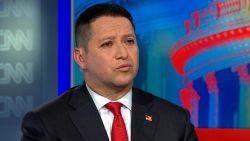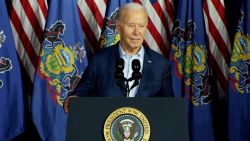American farmers are still feeling the pinch from President Donald Trump’s multifront trade war, but they finally got some good news this week when the President announced he struck an “agreement in principle” on trade with Japanese Prime Minister Shinzo Abe.
But while American pork producers say they’re happy about the deal, which is still being finalized, it only gives them the same level of access to the Japanese market as they would have gotten if Trump had never pulled out of the Obama-era Trans-Pacific Partnership in the first place.
“We’re getting what we had under the TPP and we’re not going to lag behind,” said Nick Giordano, vice president and counsel of global government affairs at the National Pork Producers Council.
Trump pulled out of the TPP as one of his first acts as President, saying he wanted to negotiate bilateral deals instead, but 11 other countries went ahead with putting it in place this past January. That left American pork producers facing higher tariffs than those in participating countries like Australia, Canada, Mexico and Chile. Meanwhile, the European Union also inked a trade deal with Japan, which lowered trade barriers for their pork exports.
American pork producers have relied on Japan as their biggest market by value. They had already seen exports slip this year, but the new deal should put them on equal footing again.
US wheat growers, who were also left hurting after Trump pulled out of the multinational trade partnership, applauded the new deal with Japan.
“We are very happy that this agreement will end the growing competitive cost advantage that Canadian and Australian wheat imports got under the Comprehensive and Progressive Trans-Pacific Partnership agreement,” said US Wheat Associates Chairman Doug Goyings, an Ohio farmer, in a statement.
Trump and Abe intend to sign the agreement on the sidelines of the United Nations General Assembly in mid-September.
Still, the agreement with Japan will only resolve one of three big problems the Trump administration’s trade policies have created for American agriculture.
“We pretty much had three five-alarm fires in the pork industry this year,” Giordano said.
One was put out in May when Trump, aiming to ease one area of trade tensions, lifted tariffs on steel and aluminum coming from Canada and Mexico. Mexico, in turn, lifted the 20% punitive tariffs it had placed on American pork.
But the trade war with China is still causing problems, and could get worse Sunday if Washington and Beijing follow through on their latest threats. In response to Trump’s announcement that he will put new tariffs on $300 billion of Chinese goods starting September 1, the Chinese will also add tariffs and raise those already on pork products.
What’s even more painful for pork producers is a worry that the tariffs might cause them to miss out on grabbing a bigger portion of the growing Chinese market. Demand there has accelerated because of an African swine fever that has wiped out some domestic hogs.
Trump’s trade dispute with China has hurt farmers and ranchers across the country. China has stopped buying soybeans, leaving a record number in storage at the end of last year’s harvest. Plus, a wet spring planting season meant that some farmers weren’t able to get their soybeans or corn in the ground in time.
Farmers are also upset over how the Trump administration recently granted 31 small refineries waivers from biofuel laws, arguing that the move will even further reduce demand for corn and soybeans.
“There’s a lot of uncertainty right now. We’re the biggest cheerleaders for the US and China to smoke the peace pipe,” Giordano said.

















